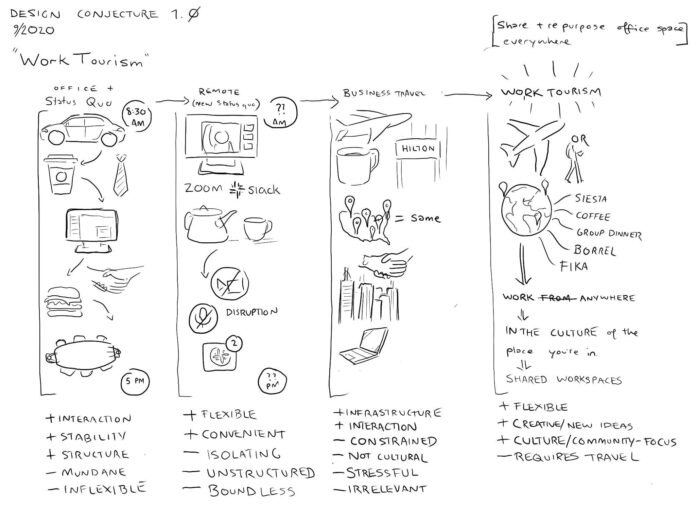Design Conjecture #1
The future of work
As remote work and distributed workplaces become the status quo, the opportunity arises to re-think the workplace and commercial real estate as a whole.
According to Matt Mullenweg, the founder and CEO of WordPress (this very website), the future of work is asynchronous, meaning that work will be done anytime from anywhere. Companies that work asynchronously will gradually become stateless – their identity will increasingly become separate from their physical location – and their workforces will become more global.
This shift had already started by the time the COVID-19 pandemic forced the immediate and widespread adoption of remote work by knowledge workforces, and it will continue. In its wake, however, new problems and opportunities will arise.
Distributed work, instead of being a niche option, will become the status quo. Companies will return to their offices in significantly smaller numbers as larger percentages of workers decide to stay working from home. Without intervention, work and life will continue their assimilation. Vast amounts of urban office space will become unoccupied. Engagement and interaction will continue to plague remote workers. And along the way, the industries tangential to office work, including restaurants, business travel, hotels, and coffee shops, will suffer.
Work tourism: consciously combining work and lifestyle
Before it was mainstream, freelancers grew used to working from anywhere with just a laptop. They could freely see the world, build new community, collaborate, and learn from a variety of cultural perspectives without the boundaries of an office space.
With work tourism, office spaces simply become decentralized, not obsolete. Workers, with the freedom afforded by remote work technology, are able to enjoy a lifestyle surrounding work that maintains a clear divide between “work” and “life.” And communities, full of coffee shops, restaurants, breweries, and commercial real estate, grow in relevance. Workers, who may opt to work this week in Sweden and that week in Spain, participating in fitka and the siesta, will expand not only their network but their life experience and frames of thought. They will more readily come up with innovative ideas all while partaking in company culture that includes the world’s culture.
And office spaces, which at one point housed the staff of one central company, will play shared host to thousands of workers from hundreds of different companies, all with new ideas and connections. The infrastructure will be repurposed to be entirely sufficient to serve not only the needs of visiting workers but also their families.
The future of the work will be asynchronous, global, and collaborative.




